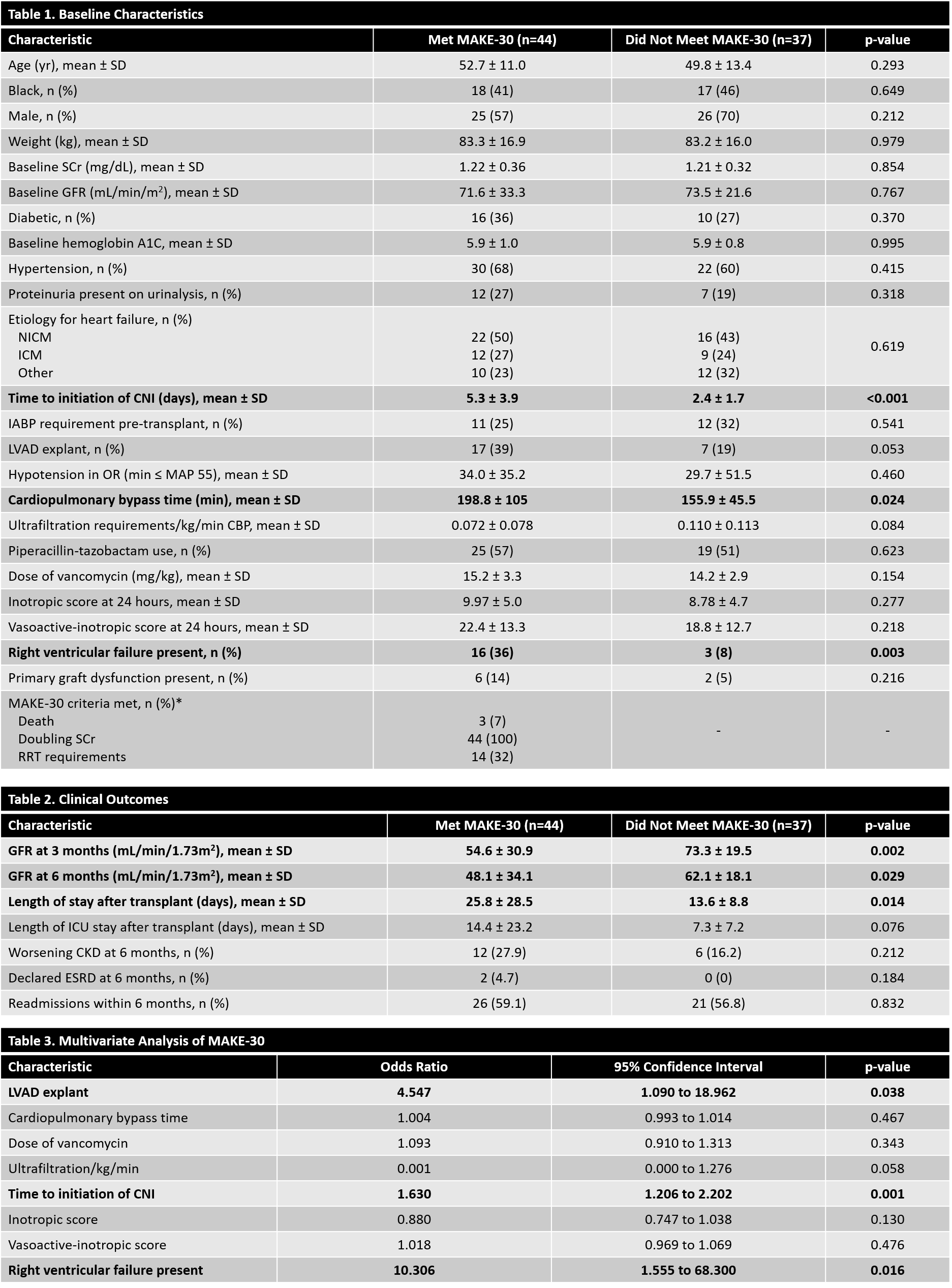Assessing the Impact of Acute Major Adverse Kidney Events on Clinical Outcomes in Heart Transplant Recipients
1Pharmacy, MUSC Health, Charleston, SC, 2Medicine, MUSC Health, Charleston, SC
Meeting: 2021 American Transplant Congress
Abstract number: 147
Keywords: Heart transplant patients, Length of stay, N/A, Renal dysfunction
Topic: Clinical Science » Heart » Heart and VADs: All Topics
Session Information
Session Name: Do's and Don'ts of Heart Transplant Care
Session Type: Rapid Fire Oral Abstract
Date: Sunday, June 6, 2021
Session Time: 4:30pm-5:30pm
 Presentation Time: 4:55pm-5:00pm
Presentation Time: 4:55pm-5:00pm
Location: Virtual
*Purpose: The purpose of this study was to elucidate contributors to the Major Adverse Kidney Events at 30 days (MAKE-30) outcome in heart transplant recipients and the effect on clinical outcomes.
*Methods: This was a single-center longitudinal cohort study of heart transplant recipients from 1/1/2015 to 6/30/2020. Patients less than 18 years old were excluded. MAKE-30, a composite of death, doubling serum creatinine, and renal replacement therapy requirements within the first 30 days after transplant was used to assess differences in clinical outcomes for the patient population. The primary outcome was length of stay post-transplant. Secondary outcomes included eGFR at 3 and 6 months, worsening CKD or diagnosis of ESRD at 6 months, length of ICU stay post-transplant, death within one year of transplant, and readmissions within 6 months.
*Results: A total of 81 patients were included in the study. Cardiopulmonary bypass (CPB) time and the presence of right ventricular (RV) failure were higher in the patients that met the MAKE-30 criteria. Otherwise, baseline characteristics were similar between groups (Table 1). In the univariate analysis, length of stay post-transplant was significantly shorter in the patients that did not meet the MAKE-30 criteria (13.6±8.8 vs. 25.8±28.5 days; p=0.014). There was a trend towards less readmissions at 6 months with the non-MAKE-30 group (45.5% vs. 66.7%; p=0.057). eGFR was significantly better in the non-MAKE-30 population at 3 (p=0.002) and 6 months (p=0.029; Table 2). In the multivariable regression analysis, pre-transplant LVADs and the presence of RV failure were associated with a significantly increased risk of meeting the MAKE-30 outcome after controlling for CPB time, UF requirements, time to initiation of calcineurin inhibitors, dose of vancomycin, and inotropic and vasoactive-inotropic score. Less UF requirements offered protection against meeting MAKE-30, although it was not statistically significant (Table 3).
*Conclusions: Length of stay was significantly shorter in patients that did not meet the MAKE-30 criteria in this study, and these patients had significantly better long-term renal function at 3 and 6 months. As shown in the multivariate analysis, having an LVAD prior to transplant and the presence of RV failure put patients at a higher risk of meeting this outcome. As this was a small retrospective study, subsequent studies are warranted to validate these findings.
To cite this abstract in AMA style:
Kelly JE, Perez C, Taber D, Tedford RJ, McMahon B, Alzaidi S, Meadows HB. Assessing the Impact of Acute Major Adverse Kidney Events on Clinical Outcomes in Heart Transplant Recipients [abstract]. Am J Transplant. 2021; 21 (suppl 3). https://atcmeetingabstracts.com/abstract/assessing-the-impact-of-acute-major-adverse-kidney-events-on-clinical-outcomes-in-heart-transplant-recipients/. Accessed February 19, 2026.« Back to 2021 American Transplant Congress

